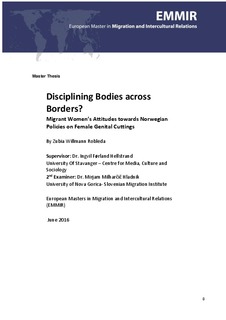| dc.contributor.author | Willmann Robleda, Zubia | |
| dc.date.accessioned | 2016-10-17T09:13:35Z | |
| dc.date.available | 2016-10-17T09:13:35Z | |
| dc.date.issued | 2016-06 | |
| dc.identifier.uri | http://hdl.handle.net/11250/2415487 | |
| dc.description | Master's thesis in Migration and intercultural relations | nb_NO |
| dc.description.abstract | This study aims at examining the issue of Female Genital Cuttings (FGC) in Norway, which is said to have one of the strictest laws on FGC. However, it has been argued that there is an incongruence between the research used by the Norwegian state and the independent research estimating the actual prevalence of the practice in the country. There has been no single individual convicted for FGC in Norway, and independent academic research has shown a negative attitude towards the practice among immigrant communities coming from practicing societies. Nevertheless, the Norwegian authorities have taken further stricter measures towards the practice. Since there is limited research reflecting the experiences and attitudes of immigrant women on the practice and policies in Norway, this work aims at involving the voices of these women and listen to their feelings and attitudes towards the Norwegian policy and discourse around FGC in Norway.
For this I have undertaken ten semi-structured interviews with women from the Somali and Eritrean community in Stavanger, Norway. Most of the women arrived as refugees/migrants and some were born in Norway. The theoretical framework behind this paper is Michel Foucault’s concept of bio-power to explain the practice of FGC as a way to discipline women’s sexuality. As social beings, we are disciplined by the society and culture around us, with each culture having its own form of discipline on the body. In some societies it may be FGC, in others plastic surgery.
The women interviewed emphasised the stigma towards the Somali community, some highlighting their Islamic faith as the reason for increased focus on them. Although, all women in this study agreed to some extent with the ban on FGC, they felt that the later additions to the law had led to hysteria and unjustified suspicion upon their community. All agreed that the Norwegian authorities should involve the Somali community when taking decisions related to FGC policies. Therefore, this paper concludes that further research needs to be done on the attitudes of the communities affected by the FGC policies in Norway. There should be more accurate knowledge of the prevalence of the practice in the country and amend the law in accordance with independent research. Most importantly, it is recommended that the Norwegian authorities work together with the affected communities so as to promote integration and eliminate the stigma, which is counterproductive to the former. | nb_NO |
| dc.language.iso | eng | nb_NO |
| dc.publisher | University of Stavanger, Norway | nb_NO |
| dc.relation.ispartofseries | Masteroppgave/UIS-HF-IGIS/2016; | |
| dc.rights | Navngivelse 3.0 Norge | * |
| dc.rights.uri | http://creativecommons.org/licenses/by/3.0/no/ | * |
| dc.subject | FGC | nb_NO |
| dc.subject | disciplinary practices | nb_NO |
| dc.subject | female body | nb_NO |
| dc.subject | Foucault | nb_NO |
| dc.subject | sexuality | nb_NO |
| dc.subject | immigrant women | nb_NO |
| dc.subject | Norway | nb_NO |
| dc.subject | refugees | nb_NO |
| dc.subject | Somalia | nb_NO |
| dc.subject | migrasjoner | nb_NO |
| dc.subject | interkulturelle relasjoner | nb_NO |
| dc.subject | kjønnslemlestelse | nb_NO |
| dc.subject | genital mutilering | nb_NO |
| dc.subject | flyktninger | nb_NO |
| dc.title | Disciplining Bodies across Borders? Migrant Women’s Attitudes towards Norwegian Policies on Female Genital Cuttings | nb_NO |
| dc.type | Master thesis | nb_NO |
| dc.subject.nsi | VDP::Social science: 200::Human geography: 290 | nb_NO |

